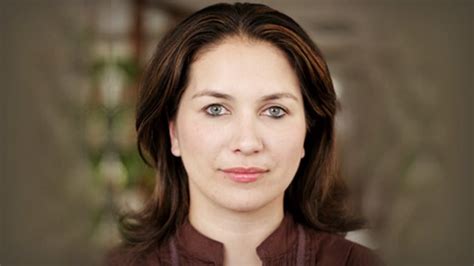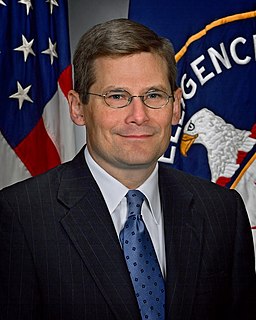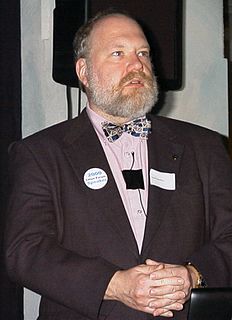Top 98 Encryption Quotes & Sayings - Page 2
Explore popular Encryption quotes.
Last updated on December 4, 2024.
They're implementing what was the strategy of Al Qaeda, which was to have attacks of different levels simultaneously. ... So the idea is, on the one hand you have these spectacular attacks that take months to plan, and others like Reda Hame, a French national, who went to Syria and was there for about a week, given a couple of days of target practice and one day of encryption training, sent back and arrested almost immediately.
Coalition [against ISIS] need the tools. And the tools involve encryption where we cannot hear what they're even planning. And when we see red flags, a father, a mother, a neighbor who says we have got a problem here, then we have to give law enforcement the ability to listen so they can disrupt these terrorist attacks before they occur.
As far as Paris goes, we don't know for sure yet how these guys communicate among themselves and how they communicated back to the ISIS leadership in Iraq and Syria, but I'm fairly confident we're going to learn they used these encrypted communication applications that have commercial encryption and are extremely difficult for companies to break - and which the companies have made the decision not to produce a key for.
We've already seen shifts happening in some of the big companies - Google, Apple - that now understand how vulnerable their customer data is, and that if it's vulnerable, then their business is, too, and so you see a beefing up of encryption technologies. At the same time, no programs have been dismantled at the governmental level, despite international pressure.
A company can spend hundreds of thousands of dollars on firewalls, intrusion detection systems and encryption and other security technologies, but if an attacker can call one trusted person within the company, and that person complies, and if the attacker gets in, then all that money spent on technology is essentially wasted.
The government can now delve into personal and private records of individuals even if they cannot be directly connected to a terrorist or foreign government. Bank records, e-mails, library records, even the track of discount cards at grocery stores can be obtained on individuals without establishing any connection to a terrorist before a judge. According to the Los Angeles Times, Al Qaeda uses sophisticated encryption devices freely available on the Internet that cannot be cracked. So the terrorists are safe from cyber-snooping, but we're not.
There is a concern that the Internet could be used to commit crimes and that advanced encryption could disguise such activity. However, we do not provide the government with phone jacks outside our homes for unlimited wiretaps. Why, then, should we grant government the Orwellian capability to listen at will and in real time to our communications across the Web?
Companies made these decisions about encryption when they were finding it very difficult to sell their products overseas because the [Edward] Snowden disclosures created the impression that the U.S. government was inside this hardware and software produced by them. They needed to do something to deal with the perception.
My favorite method of encryption is chunking revolutionary documents inside a mess of JPEG or MP3 code and emailing it off as an "image" or a "song." But besides functionality, code also possesses literary value. If we frame that code and read it through the lens of literary criticism, we will find that the past hundred years of modernist and postmodernist writing have demonstrated the artistic value of similar seemingly arbitrary arrangements of letters.
The new iPhone has encryption that protects the contents of the phone. This means if someone steals your phone - if a hacker or something images your phone - they can't read what's on the phone itself, they can't look at your pictures, they can't see the text messages you send, and so forth. But it does not stop law enforcement from tracking your movements via geolocation on the phone if they think you are involved in a kidnapping case, for example.
Sure, end-to-end encryption means that whether it's a phone call we're on or an email message we're sending or any form of electronic communication, that the content of that communication is encrypted from your device, such as your phone or PC, unto the other person's device at the other side, wherever they might be on the planet Earth.
It may be true that encryption makes certain investigations of crime more difficult. It can close down certain investigative techniques or make it harder to get access to certain kinds of electronic evidence. But it also prevents crime by making our computers, our infrastructure, our medical records, our financial records, more robust against criminals. It prevents crime.
If we try to prohibit encryption or discourage it or make it more difficult to use, we're going to suffer the consequences that will be far reaching and very difficult to reverse, and we seem to have realized that in the wake of the September 11th attacks. To the extent there is any reason to be hopeful, perhaps that's where we'll end up here.
When the September 11th attacks happened, only about a year later, the crypto community was holding its breath because here was a time when we just had an absolutely horrific terrorist attack on U.S. soil, and if the NSA and the FBI were unhappy with anything, Congress was ready to pass any law they wanted. The PATRIOT Act got pushed through very, very quickly with bipartisan support and very, very little debate, yet it didn't include anything about encryption.
[Eric]Goldman [a professor at Santa Clara University School of Law] says back in the 1990s, courts began to confront the question of whether software code is a form of speech. Goldman says the answer to that question came in a case called Bernstein v. U.S. Department of Justice. Student Daniel Bernstein who created an encryption software called Snuffle. He wanted to put it on the Internet. The government tried to prevent him, using a law meant to stop the export of firearms and munitions. Goldman says the student argued his code was a form of speech.
While we should not hesitate to deploy encryption to protect ourselves from cybercriminals, this should not be done in a way that eviscerates society's ability to defend itself against other types of criminal threats. In other words, making our virtual world more secure should not come at the expense of making us more vulnerable in the real world.























